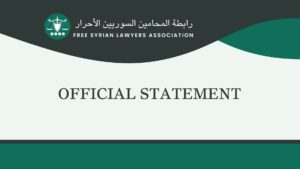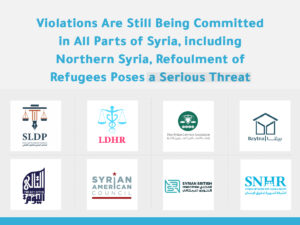Syrian First Conference on Transitional Justice
“Towards a Roadmap for Justice and Reconciliation in Syria”
Damascus – February 17, 2025
Final Statement
As participants in the Syrian First Conference on Transitional Justice, and representatives of victims and families of the missing, civil society organisations, legal experts, judges, lawyers, human rights defenders, and representatives of Syrian societal actors, we convened in Damascus on February 17, 2025, to discuss the path of transitional justice in Syria and develop a comprehensive national vision that contributes to achieving justice, accountability, and national reconciliation.
This conference takes place at a pivotal moment in Syria’s history, where there is an urgent need to address the heavy legacy of violations and crimes committed during the years of authoritarian rule by the former regime, laying the foundations for a state governed by the rule of law, respecting the dignity of all its citizens, and building a future based on truth, accountability, and reparation.
During the conference sessions, we listened to testimonies from victims and their families, insights from local and international legal experts, and in-depth discussions with stakeholders from diverse backgrounds and components of Syrian society. We collectively affirmed that transitional justice is not an option but necessary for achieving sustainable peace and rebuilding the social fabric.
Key Principles Affirmed:
1.Truth-Seeking: Recognizing the violations and crimes committed during the years of the former regime’s rule and ensuring the right of all affected individuals and victims’ families to know the truth.
2.Accountability and Ending Impunity: The necessity of holding those responsible for gross crimes and violations accountable to ensure justice and prevent their recurrence.
3.Reparation and Victim Compensation: Providing fair compensation, both material and moral, including restitution, official apologies, and guarantees of non-recurrence.
4.National Reconciliation: Achieving justice-based reconciliation that ensures the participation of all components of Syrian society without exclusion or marginalisation.
5.Rule of Law and Institutions: The necessity of building an independent judicial system capable of prosecuting those responsible for crimes and ensuring non-recurrence.
6.The Role of Civil Society and Community Organizations: Engaging civil society organisations and victims in designing and implementing transitional justice policies to ensure inclusivity, sustainability, and oversight of the process.
Recommendations and Practical Proposals:
First: Truth-Seeking and Documentation
•Establishing an Independent National Commission for Truth and Justice, tasked with collecting and documenting testimonies and facts related to violations, serving as a national reference for information on crimes committed during the years of the revolution.
•Supporting local and international documentation efforts, ensuring effective coordination with relevant governmental bodies to enhance efforts in evidence collection and analysis for fair trials.
•Empowering victims and their families with access to information through effective communication platforms to determine the fate of the missing and forcibly disappeared.
Second: Accountability and Ending Impunity
•Activating local and international accountability mechanisms and ensuring the independence of the Syrian judiciary to prosecute those responsible for gross crimes and violations.
•Cooperating with international courts to ensure that perpetrators of crimes against humanity and war crimes are brought to justice.
•Supporting the existing judiciary until special courts are established by enhancing its capacity to initiate trials of perpetrators and providing necessary legal support.
Third: Reparation and Victim Compensation
•Establishing a National Compensation Fund for Victims, financed through national resources and international support to ensure fair compensation and immediate assistance to affected individuals.
•Integrating psychological and social support programs for victims, including healthcare for survivors of torture, sexual violence, and gender-based violence.
•Restoring illegally confiscated properties and ensuring the right of displaced persons and refugees to return to their homes safely and with dignity.
Fourth: National Reconciliation and Social Fabric Reconstruction
•Launching an inclusive national dialogue on reconciliation, with the participation of all components of Syrian society to ensure a just transition to a shared future.
•Integrating transitional justice programs into educational curricula to educate future generations on past violations and prevent their recurrence.
•Strengthening the role of media in promoting a culture of transitional justice, countering hate speech, and preventing incitement to violence.
Fifth: Institutional Reform and Strengthening the Rule of Law
•Reforming the judicial system and restructuring law enforcement institutions, ensuring an independent judiciary and respect for human rights.
•Enacting national legislation aligned with international standards, defining crimes and violations subject to accountability and transitional justice.
•Establishing community oversight mechanisms for the transitional process, enabling victims and civil society to monitor the implementation of reforms and recommendations.
Sixth: Enhancing the Role of Civil Society and Community Organizations in Transitional Justice
16.Establishing the “Civil Coalition for Transitional Justice,” comprising representatives of victims, civil society organisations, community actors, and human rights entities, responsible for:
•Coordinating efforts among various stakeholders to ensure the effective and comprehensive implementation of transitional justice policies.
•Monitoring the transitional justice process, ensuring transparency and tracking progress in implementing recommendations.
•Providing support to victims and their families, facilitating communication channels between them and the entities responsible for justice implementation.
•Raising community awareness of transitional justice objectives through training programs, media campaigns, and awareness events.
•Preparing periodic reports on the implementation of recommendations, identifying challenges in the transitional justice process, and submitting them to relevant authorities.
Final Statement
Transitional justice is not merely a legal or political step but a long-term process for building peace and reconciliation in Syria. We call upon all actors, both Syrians and the international community, to support these efforts to ensure justice, redress victims, and establish a new Syria founded on the rule of law, human rights, and equal citizenship.
Finally, we extend our deep appreciation to the Syrian Bar Association, civil society and community organisations, and all participants in this conference. We’re committed to working towards the implementation of these recommendations in collaboration with all concerned entities.
Issued by the participants of the Syrian First Conference on Transitional Justice
Damascus – February 17, 2025




